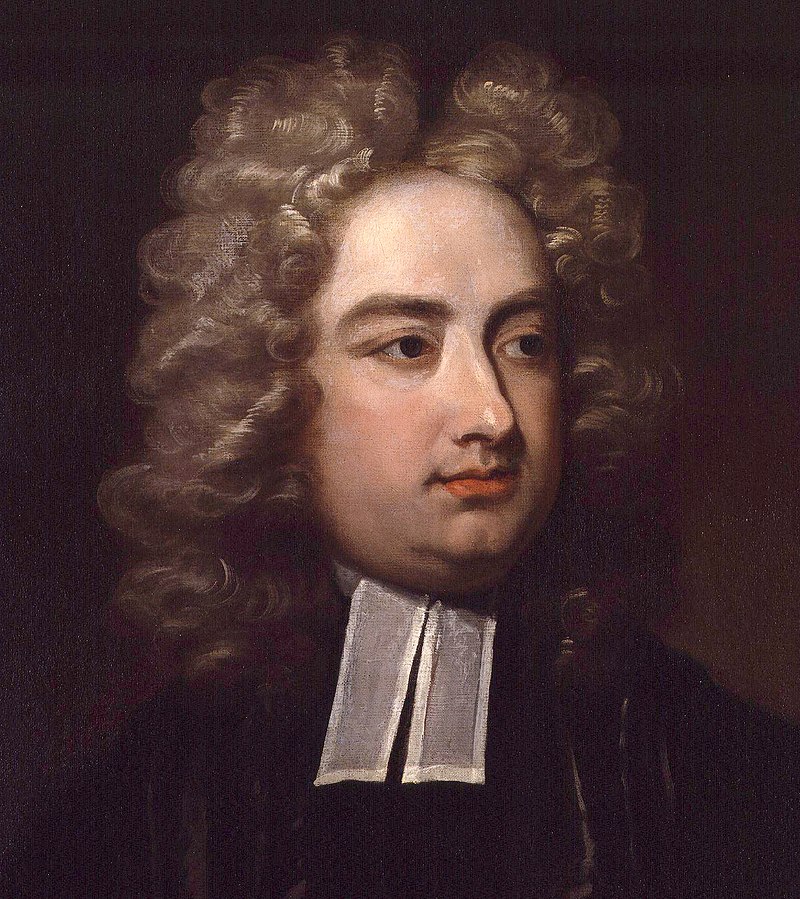Jonathan Swift was an influential Irish writer and satirist born in 1667 in Dublin in the Kingdom of Ireland. He was best known for his novel “Gulliver’s Travels.” His work often tackled political and social issues through satire, using wit and irony to comment on the state of society. Swift’s writing was known for its sharp criticism of human nature and institutions.
Besides “Gulliver’s Travels,” he wrote many essays, poems, and pamphlets that addressed various social and political concerns of his time. He was also a clergyman and held positions within the Church of Ireland.
Jonathan Swift was a master of satire, employing both the Horatian and Juvenalian styles adeptly in his works. The Horatian style is characterized by a more gentle, light-hearted, and witty approach, often poking fun at human folly and weaknesses without harshly condemning them. On the other hand, the Juvenalian style is much more biting, aggressive, and confrontational, directly attacking societal injustices and vices.
His work “A Modest Proposal” is a prime example of his use of deadpan irony, where he suggests a shocking and absurd solution to poverty in Ireland by proposing that the poor should sell their children as food to the rich. This writing is seen as a perfect example of Swift’s style of satire because it cleverly uses humor to criticize how things were in society back then, especially regarding money and social status.
The Swift family had quite a few intriguing connections to the world of literature. For instance, his grandmother, Elizabeth Swift, had connections to Sir Erasmus Dryden, who was the uncle of the renowned poet John Dryden.
Another relative, Katherine Dryden, who was related to Elizabeth, was a cousin of Sir Walter Raleigh’s wife.
Additionally, Swift’s great-great-grandmother, Margaret Swift, was the sister of Francis Godwin, whose work “The Man in the Moone” influenced parts of Swift’s “Gulliver’s Travels.”
Furthermore, his uncle Thomas Swift married the daughter of Sir William Davenant, a poet and playwright who was a godson of William Shakespeare.
In 1686 he received a B.A from Trinity College Dublin. He began studying for his master’s degree, but Ireland’s political unrest during the Glorious Revolution of 1688 led him to England, where he worked as an aide to Sir William Temple at Moor Park, Farnham. Temple, an English diplomat known for arranging the Triple Alliance of 1668, became Swift’s mentor.
During his time there, he met Esther Johnson, nicknamed “Stella,” an eight-year-old girl under Temple’s care and the daughter of a widow who served as companion to Lady Giffard, Temple’s sister. Swift became Stella’s tutor and mentor, and their relationship remained close but ambiguous throughout her life.
Later, Swift left Moor Park and took on the role of a prebend at Kilroot in the Diocese of Connor in 1694. There, he might have developed a romantic involvement with Jane Waring, whom he referred to as “Varina.”
Sir William Temple passed away in 1699. Swift said that all that was good and amiable in mankind had died with Temple. During this period, Swift wrote “The Battle of the Books,” a satire responding to critics of Temple’s “Essay upon Ancient and Modern Learning” (1690), although “Battle” wasn’t published until 1704.
Jonathan Swift’s life was marked by a series of significant events. He published “A Discourse on the Contests and Dissentions in Athens and Rome” anonymously in 1701. In 1702, he earned his Doctor of Divinity degree from Trinity College Dublin. The year 1704 saw the publication of his works “A Tale of a Tub” and “The Battle of the Books,” marking his rise as a reputable writer. His growing recognition led to enduring friendships with Alexander Pope, John Gay, and John Arbuthnot, forming the core of the Martinus Scriblerus Club.
Initially aligned with the Whigs and supportive of the Glorious Revolution, Swift later became closely associated with the Tory government. He mediated between prominent figures like Henry St John and Robert Harley. Scholars have described him “a Whig in politics and Tory in religion”.
In 1711, Swift criticized the Whig government in his political pamphlet “The Conduct of the Allies,” highlighting their failure to end the prolonged war with France. His experiences during this period were documented in letters to Esther Johnson, compiled and published posthumously as “A Journal to Stella.”
After the death of Queen Anne and the ascent of George I, the Whigs regained power. Swift redirected his efforts to support Irish causes upon returning to Ireland. Notable works during this time included “Proposal for Universal Use of Irish Manufacture” (1720), “Drapier’s Letters” (1724), and the infamous “A Modest Proposal” (1729), establishing him as an Irish patriot.
During these years, he penned his renowned masterpiece, “Gulliver’s Travels,” drawing from his political experiences. Published in 1726, it quickly became a sensation, prompting multiple printings and translations.
Tragedy struck in 1728 with the death of Esther Johnson. Swift grieved her loss and began writing “The Death of Mrs. Johnson.” His later years were marked by declining health, including a suspected stroke in 1742 that affected his speech. He passed away on October 19, 1745, at the age of nearly 78.
Swift had written his own epitaph in Latin, later poetically translated by W. B. Yeats. Posthumously, various authors explored his life and works, such as Sophie Shilleto Smith’s biography in 1910, and he continues to be honored through tributes like having a crater on Mars’s moon named after him. Additionally, authors like Edith Sitwell and A. L. Rowse contributed fictional biographies and essays, further highlighting Swift’s enduring legacy.
